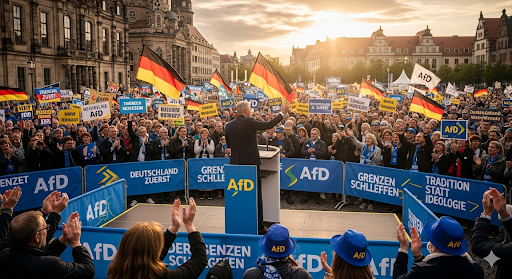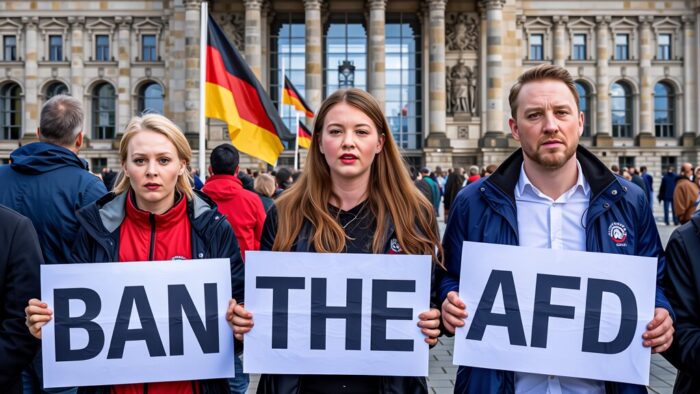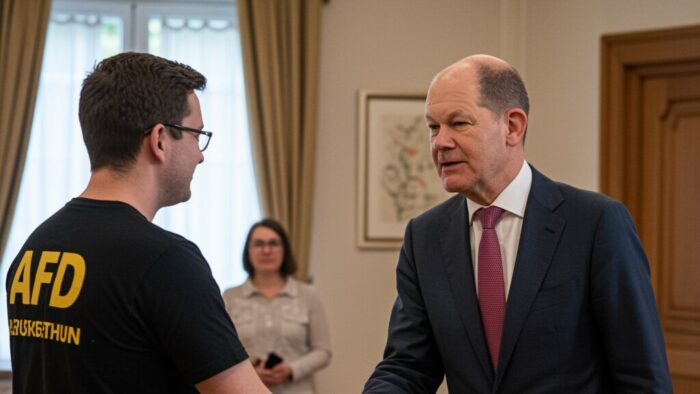The far-right Alternative for Germany (AfD), now the biggest opposition party in the Bundestag, is steadily gaining support, with some polls suggesting that the AfD has pulled ahead of Chancellor Friedrich Merz’s conservative Christian Democrats (CDU) and its allied Bavarian Christian Social Union (CSU). In September’s municipal elections across North Rhine-Westphalia, Germany’s most-populous state, the AfD tripled its share of the vote from 2020. Researchers have found that the AfD enjoys particular support among ethnic Germans who resettled from the former Soviet Union and their descendants, people often referred to as Russia Germans. According to a recent study by the Konrad Adenauer Foundation, 31% of Russia Germans are prepared to vote for the AfD.
Read more: https://www.dw.com/en/the-afd-is-drawing-support-from-russia-germans/a‑74223088
The Alternative for Germany (AfD) is a national conservative political party in Germany, founded in 2013 initially as a Eurosceptic movement opposed to the eurozone bailout policies. Since then, it has shifted significantly to the right, embracing nationalist, anti-immigration, and anti-Islam positions.
For more, see https://www.global-influence-ops.com/wiki/alternative-for-germany-afd/
Key Points
- AfD representatives will now dominate integration councils in several North Rhine-Westphalia cities, with the party taking first place in Paderborn with 24.5 percent of the vote and 27.9 percent in Detmold, both located in the administrative district with the highest share of Russian Germans.
- Political scientist Andreas Wüst said Russian Germans appear to have begun shifting their support from the conservative CDU/CSU bloc to the AfD around 2015 and 2016 when hundreds of thousands of displaced people applied for asylum in Germany.
- Unlike most other German parties, the AfD has taken a Russia-friendly stance on certain issues, with party co-leader Alice Weidel promising to rebuild the sabotaged Nord Stream gas pipelines and not including condemnation of Russia’s aggression in Ukraine in its manifesto.
- The AfD has clearly worked to reach Russian Germans through direct outreach, including having a commissioner for Russian-German affairs, distributing its programs in Russian, and recruiting several Russian Germans as party members.
Germany’s AfD and Russia: How Russian-Germans Fuel Far-Right Ties to Moscow
Germany’s Alternative for Germany (AfD) has cultivated extensive ties with Russia spanning ideological alignment, alleged espionage, and financial support. AfD politicians have made repeated visits to Russian-occupied territories, including trips to annexed Crimea and occupied Donbas, while advocating for opening the Nord Stream 2 pipeline and halting weapons deliveries to Ukraine. Multiple espionage scandals emerged in 2024, with arrests of AfD aides working for Chinese and Russian intelligence services, including Vladimir Sergienko, who coordinated pro-Russian initiatives at the direction of an FSB officer.
Investigations have also revealed allegations that prominent AfD figures received funds from a pro-Russian network linked to sanctioned Ukrainian oligarch Viktor Medvedchuk. The party’s systematic orientation toward Moscow has been particularly effective in eastern Germany, where the party benefits from residual cultural empathy with Russia among the 6 million Russian-speaking population, with RT Deutsch’s coverage displaying significant congruence with AfD positions. Russian-Germans, who constitute a significant voting bloc following their repatriation from the former Soviet Union in the 1990s, have become a core AfD constituency, with some communities delivering over 50% support for the party.
External References:
— France24: Has Germany’s far-right AfD become a gateway for Chinese and Russian spies?
— Euromaidan Press: Russia suspected of funneling funds to Germany’s AfD party for pro-Russian messaging
— The Insider: Exclusive: Far-right German parliamentary aide tasked by Russia with stopping Leopard tanks to Ukraine
— Correctiv: Alternative for Russia: How the AfD is systematically turning towards Russia
— Kyiv Independent: Rise of Germany’s AfD signals growing support for pro-Russian policies
— Harvard International Review: The Russified German Far-Right
Disclaimer:
The Global Influence Operations Report (GIOR) utilizes AI throughout the posting process, including the generation of summaries for news items, introductions, key points, and, often, the “context” section. We recommend verifying all information before use. Additionally, all images are generated using AI and are intended solely for illustrative purposes. While they represent the events or individuals discussed, they should not be interpreted as real-world photography.











